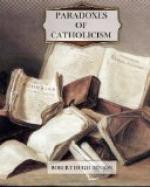“Now Catholicism is too noisy and confident altogether. See a Catholic liturgical function on some high day! Was there ever anything more arrogant? What has this blaze of colour, this shouting of voices, this blowing of trumpets to do with the soft half-lights of the world and the mystery of the darkness from which we came and to which we return? What has this clearcut dogma to do with the gentle guesses of philosophy, this optimism with the uncertainty of life and the future—above all, what sympathy has this preposterous exultation with the misery of the world?
“And how unlike, too, all this is to the spirit of the Man of Sorrows! We read that Jesus wept, but never that He laughed. His was a sad life, from the dark stable of Bethlehem to the darker hill of Calvary. He was what He was because He knew what sorrow meant; it was in His sorrows that He has touched the heart of humanity. ‘Blessed,’ he says, ‘are those that mourn.’ Blessed are they that expect nothing, for they shall not be disappointed.”
In another mood, however, our critic will find fault with our sadness.
“Why is not the religion of you Catholics more in accord with the happy world in which we live? Surely the supreme function of religion is to hearten and encourage and lay stress on the bright side of life! It should be brief, bright, and brotherly. For, after all, this is a lovely world and full of gaiety. It is true that it has its shadows, yet there can be no shadows without a sun; there is death, but see how life continually springs again from the grave. Since all things, therefore, work together for good; since God has taken pains to make the world so sweet, it is but a poor compliment to the Creator to treat it as a vale of misery. Let us, then, make the best of things and forget the worst. Let us leave the things that are behind and press forward to the things that are before. Let us insist that the world is white with a few black spots upon it, be optimistic, happy, and confident.
“You Catholics, however, are but a poor-spirited, miserable race. While other denominations are, little by little, eliminating melancholy, you are insisting upon it. While the rest of us are agreeing that Hell is but a bogy, and sin a mistake, and suffering no more than remedial, you Catholics are still insisting upon their reality—that Hell is eternal, that sin is the deliberate opposition of the human will to the Divine, and that suffering therefore is judicial. Sin, Penance, Sacrifice, Purgatory, and Hell—these are the old nightmares of dogma; and their fruits are tears, pain, and terror. What is wrong with Catholicism, then, is its gloom and its sorrow; for this is surely not the Christianity of Christ as we are now learning to understand it. Christ, rightly understood, is the Man of joy, not of Grief. He is more characteristic of Himself, so to speak, as the smiling shepherd of Galilee, surrounded by His sheep; as the lover of children and flowers and birds; as the Preacher of Life and Resurrection—He is more characteristic of Himself as crowned, ascended, and glorified, than as the blood-stained martyr of the Cross whom you set above your altars. Rejoice, then, and be exceeding glad, and you will please Him best.”




